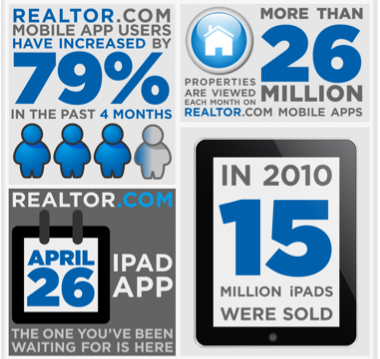You are viewing our site as an Agent, Switch Your View:
Agent | Broker Reset Filters to Default Back to List3 Ways Mobile Search Solutions Can Capture Leads: Text, Voice and Mobile Browser
May 10 2011

I'm about to make a very bold statement. Here it goes: the Internet isn't everything. Don't believe me? Then learn about mobile search, the use of cell phones to obtain information on-the-go. With the ever-increasing use of cell phones, you don't want to miss this growing trend.
REALTOR.com® released a great infographic to showcase how important mobile search is specific to the real estate industry. You won't want to miss this!



Real Estate Has Gone Mobile (INFOGRAPHIC) | REALTOR.com® Blogs | Real Estate
Mobile Search in Action
Mobile search is good for buyers because they can get the info they want, the way they want it, when they want it. It's good for REALTORS® because it allows them to convert interest into leads – and leads into sales. Don't worry if this is all still a little unclear. It may be easier to understand if you know how mobile search is used. Let's run through a hypothetical.
Once upon a time . . .
John Q. Homebuyer is standing in front of one of your listings (123 Main St.). He's interested in learning more about the property – and he has his cell phone with him. If you're set up for mobile search, he can call the phone number listed on your sign and learn more about the property in several ways.
- He can request a text message. Once received, the message will contain essential information about the property. In turn, essential information about Mr. Homebuyer will be transmitted to you. Unfortunately, text messages have a certain character limit (usually 160 characters), which is not always enough room for a full property description. In addition, as text messages usually require an additional monthly fee for cell phone users, not everyone will be able to receive text messages.
- He can listen to a pleasant, informative audio description of the property. You didn't have to record the audio message yourself; in fact, advanced technology has automatically generated a script, saving you time and ensuring quality. The audio message is also available in Spanish, making the information accessible to a wider group of potential buyers. The information is also accessible no matter what type of phone Mr. Homebuyer has – smartphone or "dumbphone."
- If Mr. Homebuyer has a smartphone, he can use his Web browser to learn more about the property on your website. He may also decide to use one or several of the many smartphone apps available, such as the Realtor.com app.
Mr. Homebuyer reviews the text message, listens to the audio description, or views the property details on his smartphone. As he's learning more, you're receiving his contact information via text and email. You can contact him immediately or (if he has opted for the audio description) the call may be transferred directly to you, so you can chat with Mr. Homebuyer yourself. Now that's a happy ending!
Keep in mind that this is just one example of how mobile search can be used. People may also use mobile search if they see the property in magazines, newspapers, on the Web, and elsewhere. You'll learn where the lead came from, helping you gauge where your marketing dollars are most efficient.
Get Started
You'll forgive a little levity in the delivery of the message here, and believe me that I'm completely sincere – if you're not already, I encourage you to investigate how mobile search could help your business. After all, the mobile Web grew more than 100% in 2010, and continues to grow. New developments are making it even more user-friendly; I'll give you an example: QR barcodes on real estate signs that, when scanned with a smartphone, send potential buyers to your property details.
To get started, there a variety of companies that can help:
- Voice Messaging: VoicePad®
- Text Message Marketing: Mobile Real Estate ID, Goomzee, Knovolo and others.
- Mobile Browsers IDX Search: Mobile Real Estate ID, Hillside Software, iHOUSEWeb, RealtyTech, VoicePad® and others.











